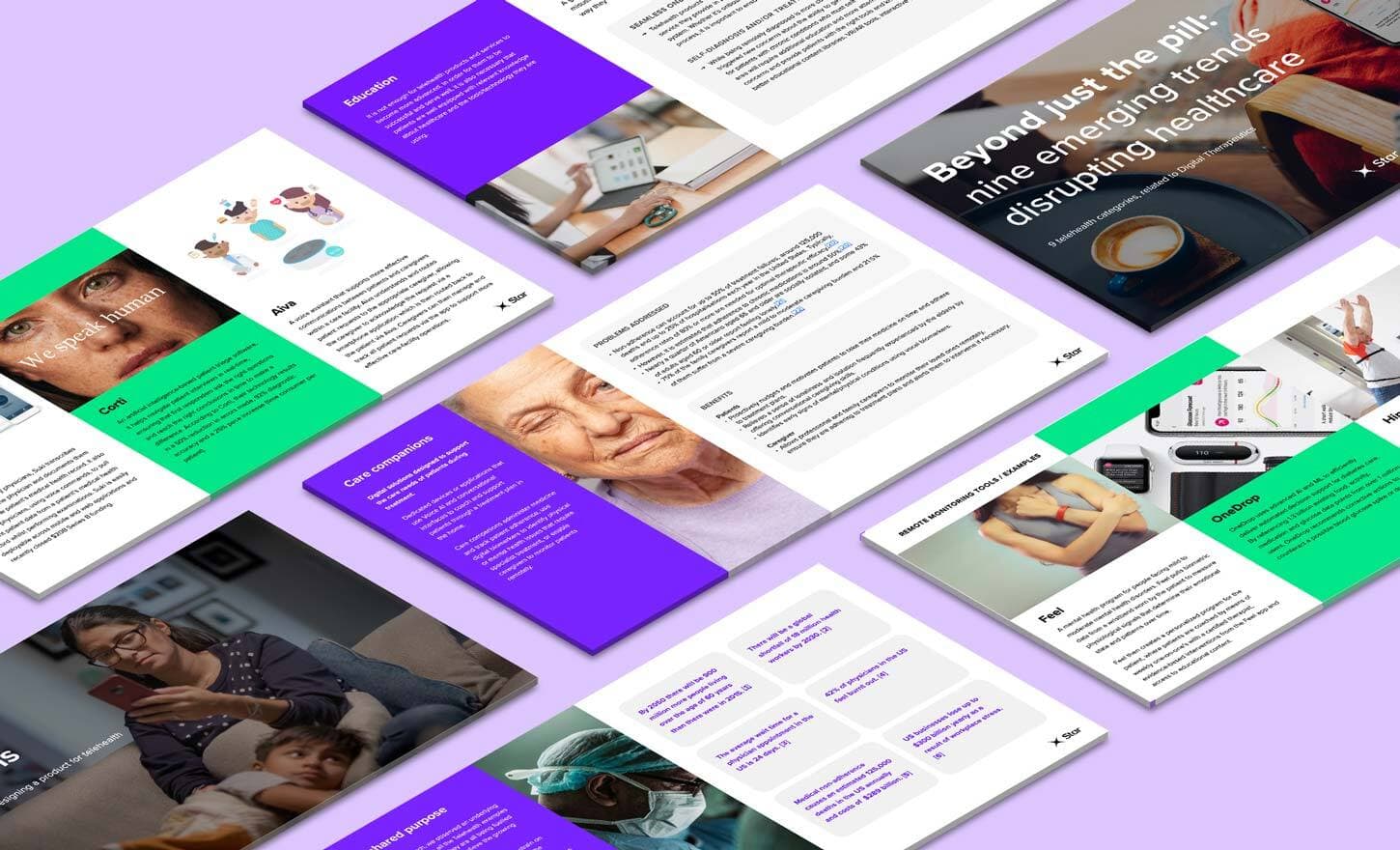
Downloading a prescription therapy directly to your smartphone sounds like technology from the future. However, digital therapeutics (DTx) are already here and delivering on-demand, personalized and patient-centric healthcare.
Over the next ten years, DTx applications are projected to skyrocket across every aspect of medicine. How will digital therapeutics challenge our conception of healthcare? And what obstacles must it overcome to achieve wide-scale adoption?
We gathered four digital health leaders in this expert roundup episode to answer these questions and more. Below is a small selection of the fascinating DTx insights they shared. To hear everything these innovators had to say, listen to the complete podcast.
- Personalization is a DTx cornerstone. With DTx, health intervention becomes customized and tailored to individuals. Matt Omernick described how DTx treatment is like a pill that "anyone that experiences it...is getting a completely different pill [treatment] that changes every single day for them and for them alone," creating adaptable and effective therapies that adapt to changes in patient health.
- FDA-Approved and OTC products both have a place. In these early days of DTx, distinguishing between approved digital therapeutics and health apps like brain games and mediation exercises can be difficult. But both are necessary and can work together to support the overall goal of promoting health and wellness because, as David Box notes, "over-the-counter DTx [is also useful] because it's ultimately helping improve patient health by or through adherence” even if a product doesn’t necessarily have FDA approval.
- Achieving FDA Approval is challenging but will begin to get quicker. DTx is an entirely new class of medicine. As a result, there is no dedicated roadmap for achieving FDA and other regulatory body approval. Nonetheless, Shrawan Patel noted that the barriers to regulatory approval will shrink after the first wave of DTx hits the market, "once one [digital therapeutic] is out there, more can come down the pipeline because it can act as what's called a predicate...that allows other companies to come onto the market" helping to facilitate faster product development in the future.
- Quicker testing through harnessing large data sets. Data opens up new frameworks for product testing. Consequently, the past model of controlled, double-blind studies are starting to grow "more and more outdated," according to David Cox. Instead, we are "starting to move towards a world where the volume of data plays a part in the conversation around proof."
Subscribe on Apple Podcast | Subscribe on Spotify
The future of digital therapeutics
As David Cox notes, "there's no silver bullet” for building large-scale DTx solutions that drive universal adoption. But we're headed in the right direction. Apps like Constant Therapy, for example, already have 400,000+ downloads and give a glimpse of what a DTx-driven future might look like.
Over the next 5-10 years, we'll see digital therapeutics transform medicine in a variety of expected and unexpected ways:
- Technology integration. Star's David Box noted how digital therapeutic would delight and surprise us with "technologies that don't even exist today," including potential combinations of implantables, wearables, and software.
- Prevention rather than treatment. All the guests agreed healthcare would shift gears to focus on preventative care. We can imagine the evolution of today's smart fridges, for instance, that already can order food for you when you’re running low. David Cox projected "then accelerate that [technology] forwards….when it knows enough about you to know what's bad for you, and what's good for you...then it's going to be ordering the right types of foods for you to eat…[resulting in] the perfect diet for you.” DTx will be doing this across a range of products across people’s lives creating more comprehensive preventive care for everyone.
- Treatment with fewer side effects. Right now, clinicians often use medications as first line treatments for patients, yet every medication comes with its own set of side effects. We tolerate these adverse effects as no viable alternatives exist. Shrawan Patel illustrated how DTx would alter this paradigm by opening new channels where clinicians could “instead of trialing a drug first (biopharmaceutic) you can trial a digital therapeutic. So you have none of the biopharmaceutic’s effects to worry about.” The result is effective first line treatments for patients without the negative side effects that come with traditional medications.
- Greater emphasis on cognitive and mental health. The immense success of both DTx interventions like Constant Therapy along with OTC products such as Headspace indicate growing cognitive and mental health focus in the healthcare community. Matt Omernick described this emerging trend and how "smart insurers and payers out there already know this" and believe it will "pay dividends down the road for our health" as well as their bottom line.
Dive into DTx and the evolution of healthcare
Matt Omernick summed up the changes DTx will deliver noting that “interacting with our medicine can actually be enjoyable, early, and even preventative.” This is just the beginning of what DTx can do for our relationship to our health. Imagine where we’ll be in ten years.
We've just only begun to discuss the fascinating insights these DTx experts shared. Listen to the podcast to hear more about digital therapeutics and the future of healthcare.

Before you do, download our trend report. In it, we explore 9 digital health categories that will redefine healthcare over the next decade. It's the perfect in-depth look at leading DTx products and how you can start on the journey towards building your own patient-centric and scalable digital therapeutic solutions.






